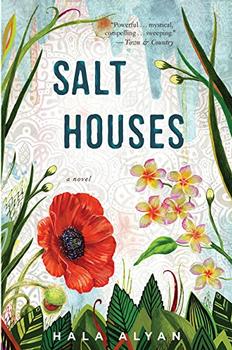Summary | Excerpt | Reading Guide | Discuss | Reviews | Beyond the Book | Readalikes | Genres & Themes | Author Bio

Alia was distinct as a child, unlike Widad with her gentle dolor or Mustafa who went from a colicky baby to a prickly child, throwing tantrums whenever he was refused anything. There were years between each child, years during which Salma was pregnant and miscarried six times. This betrayal of her body hobbled her; she felt shame at her belly, which stretched only to flatten again. In this way she failed, and, though Hussam was kind, bringing her tea each time she lay defeated in their bed, she knew his disappointment. She'd given him a daughter as firstborn—the first woman in five generations to do so—and was able to carry only one son in the basket of her womb.
It isn't that Alia is her favorite child. All her children are prized; they are the glow of her. It is more that Salma has always felt drawn to her, a magnetism delicate and stubborn as cobweb thread. Alia is a child of war. She was barely three when the Israeli army rolled through Jaffa's streets, the tanks smashing the marketplace, the soldiers dragging half-sleeping men from their homes. There would be the birth of a new nation, they declared. Salma and Hussam's villa sat atop a small hill that overlooked the sea, with orange groves banded beneath it in strips.
Within days the groves were mangled, soil impaled with wooden stakes, oranges scattered, pulp leaking from battered flesh. Alia had cried not at the sound of gunfire but at the smell of the mashed oranges, demanding slices of the fruit. By then, the men who worked for their groves were gone, most having fled, some with bullets nested in their skulls. Hussam refused to leave at first, shaking his fist at the sea and land outside their windows, the view that beckoned them like another room.
"You go," he told her, "go to your uncles in Nablus. Take the children." She begged and begged, but he wouldn't budge. Only when burning rags were hurled into their groves did he tell her, dully, to pack for all of them. They stood on the veranda while the children slept, watching the fire streak across their land, listening to the muffled shouts. The smell of burned oranges rose to them, scorched and sweet.
Only Alia mentioned Jaffa after they arrived at Nablus, with the tactlessness of the very young. She asked for the licorice sticks the grocer used to give her, for the dolls in her old bedroom. She cried at the thunderous sound of automobiles snaking through the Nablus marketplace. Widad and Mustafa looked pained when Alia spoke of these things, glancing at Hussam to see if he'd heard. Their father in Nablus was a transformed creature, cheerless and short-tempered. He no longer made growling sounds when he was hungry, mimicking a lion or bear until they giggled. He no longer asked them to stand straight in front of him and recite Hafiz Ibrahim's poetry, adopting a mock sternness when they faltered. When he spoke with Widad or Mustafa, he seemed to be unfocused. Every evening he listened to the radio raptly.
But Salma was cheered when her daughter mentioned Jaffa. She felt grateful. Salma missed her home with a tenacity that never quite abated. She spent the first years in Nablus daydreaming of returning. The early days of summer, the vision of the house rising as the road coiled around the cliff. Inside, a miracle: everything as she'd left it, even the damp laundry she'd never gotten to hang up. She understood the flaw of these fantasies. The villa was gone, razed to the soil. The groves had been replanted and new workers picked the browned leaves, new owners baked bread with the orange rinds. Still, her heart stirred when Alia, even at six, seven years old, spoke with the reverence of a mythologist about the enormous Jaffa pomegranates, the seeds that could be spooned out and sprinkled with either salt or sugar, depending on their ripeness.
"They were as big as the moon," little Alia would say, holding her starfish hands out, her voice confident.
Excerpted from Salt Houses by Hala Alyan. Copyright © 2017 by Hala Alyan. Used by permission of Houghton Mifflin Harcourt Publishing Company. All rights reserved.
Your guide toexceptional books
BookBrowse seeks out and recommends the best in contemporary fiction and nonfiction—books that not only engage and entertain but also deepen our understanding of ourselves and the world around us.